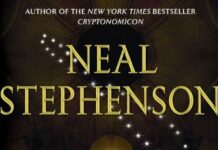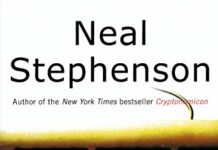
Ebook Info
- Published: 2017
- Number of pages: 769 pages
- Format: Epub
- File Size: 0.71 MB
- Authors: Neal Stephenson
Description
When Melisande Stokes, an expert in linguistics and languages, accidently meets military intelligence operator Tristan Lyons in a hallway at Harvard University, it is the beginning of a chain of events that will alter their lives and human history itself. The young man from a shadowy government entity approaches Mel, a low-level faculty member, with an incredible offer. The only condition: she must sign a nondisclosure agreement in return for the rather large sum of money.
Tristan needs Mel to translate some very old documents, which, if authentic, are earth-shattering. They prove that magic actually existed and was practiced for centuries. But the arrival of the scientific revolution and the Age of Enlightenment weakened its power and endangered its practitioners. Magic stopped working altogether in 1851, at the time of the Great Exhibition at London’s Crystal Palace—the world’s fair celebrating the rise of industrial technology and commerce. Something about the modern world “jams” the “frequencies” used by magic, and it’s up to Tristan to find out why.
And so the Department of Diachronic Operations—D.O.D.O. —gets cracking on its real mission: to develop a device that can bring magic back, and send Diachronic Operatives back in time to keep it alive . . . and meddle with a little history at the same time. But while Tristan and his expanding operation master the science and build the technology, they overlook the mercurial—and treacherous—nature of the human heart.
Written with the genius, complexity, and innovation that characterize all of Neal Stephenson’s work and steeped with the down-to-earth warmth and humor of Nicole Galland’s storytelling style, this exciting and vividly realized work of science fiction will make you believe in the impossible, and take you to places—and times—beyond imagining.
User’s Reviews
Neal Stephenson is known for his speculative fiction works, variously categorized as science fiction, historical fiction, maximalism, and cyberpunk. He is the author of the bestselling Reamde, Anathem, the three-volume historical epic the Baroque Cycle as well as Snow Crash, which was named one of Time magazine’s Top 100 All-Time Best English-language Novels. He also writes nonfiction articles about technology in publications such as Wired magazine and has worked part time as an adviser for Blue Origin, a company developing a manned suborbital launch system.Nicole Galland’s five previous novels are The Fool’s Tale; Revenge of the Rose; Crossed; I, Iago; and Godiva. She writes a cheeky etiquette column for the Martha’s Vineyard Times. She is married to actor Billy Meleady and owns Leuco, a dog of splendid qualities. –This text refers to the audioCD edition. Review “[An] immense and immensely entertaining genre-hopping yarn. . . . A departure for both authors and a pleasing combination of much appeal to fans of speculative fiction.” (Kirkus Reviews (starred review))“Quantum physics, witchcraft, and multiple groups with conflicting agendas, playfully mixed with vernacular from several centuries and a dizzying number of acronyms, create a fascinating experiment in speculation and metafiction that never loses sight of the human foibles and affections of its cast.” (Publishers Weekly)“[An] enticing speculative thriller . . . a complex and engaging what-if tale that blends technology and history.” (Booklist (starred review))“There’s a lot going on here—stylistic flourishes, comedic pratfalls, romance and science—but it’s handled deftly. Those familiar with Stephenson will recognize his humor and ideas, while Galland (author of Stepdog, Crossed, Revenge of the Rose and others) brings a fresh and irresistible voice to this ambitious novel.” (Washington Post)“Glorious.” (Cory Doctorow, Prometheus Award winning author of Homeland)“The Rise and Fall of D.O.D.O. reflects the familiarity of authors comfortable in their respective genres and who trust the change of style the other brings. The book is more than the sum of its authors’ parts.” (The Straits Times)“Stephenson and Galland, full of zest and brio, have expertly assembled…a delicious soufflé of adventure, laughter, hubris, and mind-twisting diachronic paradoxes.” (Locus)“[The Rise and Fall of D.O.D.O.] explores the boundary between magic and science with wit, intellectual intensity and panache.” (Financial Times)“Whimscial and chaotic. . . .Crack the covers and time will seem to slip away.” (Toronto Star)“The Rise and Fall of D.O.D.O. is a high-stakes techno-farce with brains and heart.” (San Francisco Chronicle) –This text refers to an alternate kindle_edition edition. From the Inside Flap When Melisande Stokes, an expert in linguistics and languages, accidently meets military intelligence operative Tristan Lyons in a hallway at Harvard University, it is the beginning of a chain of events that will alter their lives and human history itself. The young man from a shadowy government entity approaches Mel, a low-level faculty member, with an incredible offer. The only condition: she must swear herself to secrecy in return for the rather large sum of money.Tristan needs Mel to translate some very old documents, which, if authentic, are earth-shattering. They prove that magic actually existed and was practiced for centuries. But the arrival of the scientific revolution and the Age of Enlightenment weakened its power and endangered its practitioners. Magic stopped working altogether in 1851, at the time of the Great Exhibition at London’s Crystal Palace–the world’s fair celebrating the rise of industrial technology and commerce. Something about the modern world “jams” the “frequencies” used by magic, and it’s up to Tristan to find out why. And so the Department of Diachronic Operatives–D.O.D.O.–gets cracking on its real mission: to develop a device that can bring magic back, and send Diachronic Operatives back in time to keep it alive . . . and meddle with a little history at the same time. But while Tristan and his expanding operation master the science and build the technology, they overlook the mercurial–and treacherous–nature of the human heart.–The Straits Times –This text refers to an alternate kindle_edition edition. From the Back Cover When Melisande Stokes, an expert in linguistics and languages, accidently meets military intelligence operative Tristan Lyons in a hallway at Harvard University, it is the beginning of a chain of events that will alter their lives and human history itself. The young man from a shadowy government entity approaches Mel, a low-level faculty member, with an incredible offer. The only condition: she must swear herself to secrecy in return for the rather large sum of money.Tristan needs Mel to translate some very old documents, which, if authentic, are earth-shattering. They prove that magic actually existed and was practiced for centuries. But the arrival of the scientific revolution and the Age of Enlightenment weakened its power and endangered its practitioners. Magic stopped working altogether in 1851, at the time of the Great Exhibition at London’s Crystal Palace—the world’s fair celebrating the rise of industrial technology and commerce. Something about the modern world “jams” the “frequencies” used by magic, and it’s up to Tristan to find out why. And so the Department of Diachronic Operatives—D.O.D.O.—gets cracking on its real mission: to develop a device that can bring magic back, and send Diachronic Operatives back in time to keep it alive . . . and meddle with a little history at the same time. But while Tristan and his expanding operation master the science and build the technology, they overlook the mercurial—and treacherous—nature of the human heart. –This text refers to an alternate kindle_edition edition. Read more
Reviews from Amazon users, collected at the time the book is getting published on UniedVRG. It can be related to shiping or paper quality instead of the book content:
⭐ I wish I could return it and forget I ever saw this book. Many other negative reviews have covered many of my problems so I will just highlight the most grievous offenses. First too many stereotypical military/government/academical types just there to be obtuse, narrow-minded enablers of chaos (trust me on this one). A couple of “anachons” who were way too modern and savvy for the times they came from, especially the Viking. The arbitrary nature of the “shears” i.e. minor offenses cause disaster while big offenses did nothing. All of this though pales in the light of the giant self-fulfilling paradox on which the entire plot is built and which the characters involved don’t even question. Everything could have been averted with a couple of questions before anything really got started.
⭐ Another author would get 3 stars for this. Mr. Stephenson gets 2 because I expect better from him, especially at a high price.Short version: The book is interesting, sometimes funny, often shallow. The characters are one-dimensional (except Rebecca). The military jargon is bad. The use of letters/diaries/journals as the narrative works ok, but there’s no framing story to explain why these things are collected, or by whom. The mechanics of magic are believable enough to suspend disbelief.I read at least one volume of the Baroque Cycle ( The Baroque Cycle: Quicksilver, The Confusion, and The System of the World ) every year. The characters are believable, consistent, and so well-developed over their lives that I can jump back into Quicksilver and remember young Eliza after having last read about older pock-marked Eliza in SotW and feel like I’m meeting her again. It takes place across such important historical events and does such a good job of putting characters in places of import with humor and subtlety that make it all just so fascinating.I’ve also read a lot of Clancy’s Ryan books. Clancy did a lot of collaborative stuff, too. I remember reading the first Net Force book. I feel about The Rise and Fall of D.O.D.O (dodo) the same way as I do about Net Force. It was fun. I remember liking the plot and the character interactions, but I can tell you nothing now of substance about any of them. Prior military, I think? One had a Plymouth Prowler? They were throw-away books. Fun, but not meaningful.Dodo feels like a read-and-forget novel that is leading into a series. It ends without resolution, and given that the former work these authors did together was a number of books in series, I’m expecting to see more of these. If they show, I’ll wait for the reviews before deciding if it’s worth the time/money. There are many things touched on but never utilized that a good edit would have removed, unless they will be needed later. Storing data in an ODEC, for example.In closing.. read it if you’ve got the time and the price comes down, but if you are a fan of NS, lower your expectations.
⭐ The premise of the book is everything you would expect from a Stephenson book. A unique blend of science, society, situation all with a twist. It’s one of the reasons I like his work. This starts out that way with a novel connection of Quantum Mechanics, Schroeder’s cat, covert operations and witchcraft all around time travel. I was really looking forward to the book and for the first half it delivered, the only issue is that Stephenson forgot he needed to write an ending. Where other books had drama as they reach a climax, that never happens here. The book just fizzles at the end and leaves you with an ending that seems more like a pilot for a time travel drama on TV than a work of provocative fiction.This is really hard for me to write, but its the first book by Stephenson that I have read that I wished I could get my money back. It’s the first book that I would suggest even fans avoid.I hate to say this as it has all the right ingredients, vivid and interesting characters, a great premise and an insight into bureaucracy that is both smart and snarky at the same time. Those are the real strengths of this book.The failure is in the plot and what it is driving to. There is a plot at the start, but then it fails to materialize. There is no real antagonist or villain.. Sure there is, but they are not as villainous as they shoudl be to drive a story.In the movies, they fault the director of a movie which has a great cast but does not seem to deliver. This is the case here. Not Stephenson’s best and it may be his worst work.
⭐ Reading the reviews I see that the world of Neal Stephenson readers are split between Anathem lovers and Reamde fans. Apparently I have some witching blood within me that enables me to inhabit both worlds. He could write 20 more of both types and I’d be delighted. Having sorted these strands, it is accurate to group this more with Reamde: less sci-fi, more weird thriller. While missing some of Stephenson’s distinctiveness, there are scenes, particularly the retail assault, that are unforgettably entertaining.Readers of the Baroque Cycle will also detect common strands. Reading those books I became convinced that if you could magically transport to the 1600’s the first thing you would do is die. Due to people or bacteria, either way it would be pretty swift. This is addressed. Mr. Stephenson’s in depth research into historical sword fighting realities is nicely interwoven.I’ve never read anything by Nicole Galland and maybe those stories aren’t my type. While the structure of the novel perhaps made it easier for two to author, I’m not a close enough reader to know who wrote which. And that, in turn, made it a smooth reading. I’m happy they pulled it off.As a note of reference setting, I’d have a hard time ranking a Neal Stephenson work under 5 stars. Yes, I could manage to rank his books in my own ordering, but these review stars are compared to all the other books an Amazon shopper might download. So it’s an easy 5.
⭐ I adore Neal Stephenson. He’s proof that some minds just work better than others. I enjoy his books and look forward to many more. This one, well did not work for me. Exciting intro, compelling idea launched me into the middle where the plot kinds of stalls out and then somewhere I just stopped caring about the characters or what happened next and put it down with a disappointed sigh. It was so bad I had to go read Diamond Age to wash the taste of poor prose out of my mouth. It is the literary equivalent of the movie League of Extraordinary Gentlemen.
⭐ Melisande and Tristan are unlikely partners in a high-tech startup. Mel is academe, Tristan military. Mel speaks and reads dozens of—maybe a hundred—ancient languages, Tristan is fluent in the one languge she is not: bureaucratese. But Mel can’t stand her current academic mentor, a sleezy fellow who takes credit for her work and makes unwanted sexual overtures to his protégée. She says yes to a high salary with benefits, and launches into the effort to help develop a new technology with military applications: Magic.Usually, I need at least two complete read-throughs of a Neal Stephenson novel, with some intervening months to absorb the revealed technology. Not this time. What Neal and co-author Nicole Galland have done is to examine the real-life implications of successful time travel (or “diachronic operations”, the second “D.O.” of the secret Department’s title), while they simultaneously expose and lampoon the inevitable bureacratic takeover of a technical endeavor.Even without the ancient tongues that bring Melisande into the Department, the language is dizzyingly, deliciously convoluted. Military acronyms and bureaucratic double-speak abound. My favorite passage involved the attempt of a rigid office-manager boffin to prevent the techies from using unsanctioned acronyms and labels. (The techies promptly labeled her policy memo with an unsanctioned acronym, of course.)Perhaps the story’s accessibility is due to the combination of Stephenson’s favored ‘Innis mode’ with a mixture of narration and epistolary delivery, particularly suitable to a novel in which time travel has scrambled the chronology. Some of those epistles are email, some are hand-scribed letters and journals written on parchment—some are even carved into living flesh. (Further detail might be a spoiler!)On the other hand, as I read I found myself uncomfortably reminded of my experiences in the late 80s and early 90s, working for a tech firm started by engineers. At the time I signed on, the founders were still in the top management positions, and we had a one-of-a-kind product in a brand-new tech niche. I was there when a venture capital firm bought out the company, still there when they “retired” the founder CEO and replaced him with a business-type. I left when the engineer-COO and engineer-R&D chief were also replaced by MBAs. (The firm was out of business a year later.)No doubt that personal history added to my enjoyment of the eventual “fall” implied in the novel’s title. But you need not have had a similar traumatic experience; D.O.D.O. is a great story, and you won’t want to miss it!
⭐ D.O.D.O. is an uneven novel that never quite succeeds as any one thing, but it’s still fun as a not-too-serious sci-fi romp. I “read” most of the book in its Audible version over a few long car trips, and it was a good companion. If it weren’t for the audio version, the book would probably still be sitting unopened, so the readers (especially Tavia Gilbert and Kate Udall) really deserve one of the four stars I’m giving the book.The story starts out as old-school sci-fi meets romance novel, and I almost gave up on it until the witch Gráinne (oddly, the character I found most believable—a low bar, since most of the characters are underdeveloped and I found none of them quite believable) entered the picture. As a Stephenson fan (I don’t know Galland’s work), I began to feel more at home once some time travel started happening and there was some geeking out over historical details. (Not much geeking out, by Stephenson’s standards, though. I found it especially odd that there wasn’t more geeking out about language, giving that the main character, Mel, is a linguist. And that character never rang true to me, in part because the treatment of her as a linguist—and as an academic generally—seemed off the mark.)Later, the authors really start to have fun parodying large bureaucracies like the Pentagon. (At times, there’s a whiff of Lem’s Memoirs Found in a Bathtub, as seen in a fun-house mirror where bureaucracies are actually funny instead of terrifying, and I wonder what this story could have been if constructed more along those lines.) Large portions of the story are advanced through transcripts of interviews, emails, radio communications, and memos, and for me the best bits of the novel were here. Things do fall part at the end, and the authors seem to struggle to wrap up the plot coherently, but by then I was invested enough to see the story through.I think most of my fellow Stephenson fans will enjoy D.O.D.O., if they approach it as a fun diversion. There are many better sci-fi books out there. But if, like me, you’ve already read a large percentage of them and you’re just looking for a distraction during a long drive, there’s some fun to be found in this story.
⭐ Like putting a V12 engine into an ’88 Chevette, but without the enhanced performance… just making it a colossal waste of time and money. Time travel, secret government agencies and wealthy, seemingly omnipotent families that appear to have existed as long as time itself. The core concept of this book sounded like it would be a fun, interesting read even for someone such as myself who isn’t really a fan of this genre. Unfortunately though, first few pages promise things that quite frankly, the author(s) never deliver.Imagine being told that magic, actual magic, was real and that there is a government plan to bring it back. The shock of this reveal to the characters is one that I, the reader, was looking forward to. However, Melissande seems to buy it with very little push back. In fact, when told of the actual existence of magic, time travel and witches, not one character seemed even the least bit skeptical which made the book a bit boring and unrealistic. The characters are poorly developed and one-dimensional which I guess would be cool if this were a 100-page short story. ‘Rise and Fall…’ however is essentially an unabridged dictionary, chock full of a confusing array of acronyms, never-ending ramblings and memos. If the point of the novel was to illustrate to the reader the life and fun-sucking nature of internal email, memos and corporate policy then it has served its purpose. Unfortunately however, many of us read novels to ESCAPE mundane minutia, not to be bombarded with it.The author spent nearly 10% of the book on these ‘office communications’, but only briefly hinted at WHY the government would spend such time and resources into magic. Hinting vaguely that other countries may have a witch/ODEC at their disposal, but never delving deeper into this possibility. With seemingly hundreds of employees doing thousands of ‘DTAP’s costing millions of dollars, we never even see a single useful result, leaving the reader with a never ending parade of ‘why’s’. Why is the government even doing this? Why do the witches join when they have nothing truly to gain? Why would Tristan not be suspicious when he was told he was being Sent to 20,000 B.C.? Why were so many words given to Rebecca Oda, but so little spent on actual detail? When a novel is 768 pages, there should never be a lack of detail. The author spends many pages painting D.O.D.O. as a shadowy government entity, while at the same time showing that literally EVERY ONE was invited to just walk in off the street to join. LARPers, spouses, coffee shop employees and costumed children and family members all are just allowed be inducted, while historical figures are left to walk modern streets unsupervised.To close, I personally believe that what makes science fiction and fantasy great is that it should be wonderfully unbelievable, but realistic. D.O.D.O. fails in that the novel is horribly unrealistic, while never really taking the time to explore the unbelievable, leading to nearly a thousand pages of office paperwork for the reader to sift through.
⭐ This book is a hard left turn away from the hard science of Seveneves and a return to the sharp satirical fun of Snow Crash.Magic is dead, dealt a final death blow by the first photographs of the 1851 eclipse. All except for one very old witch and a new way to perform Schroedinger’s famous cat experiment (uh, yes, there is some real science in this book, but the Multiverse interpretation of quantum mechanics is merely the background explanation for the book’s scenarios).The book careens through 1600 England (shades of the Baroque cycle, and Shakespeare comes in for some hard digs), 1200 Constantinople, the 1851 London Exposition, 1850 San Francisco, and most importantly current time military-industrial-Silicon Valley startup organization/culture (ISO 9000 strictures as applied to witches? A literal LOL!). All very much fun.There is not a great deal of character development or robustness; the cast, while quite varied, are pretty much set-pieces to advance the plot. While most of the settings/action points are admirably suited to Stephenson’s style of barbed exposition, I did find the Viking raid on a WalMart very flat, not in keeping with the rest, and the books conclusion not nearly as much of a bang-up as I expected. Stephenson does use multiple styles of presentation within this, from diaries to Power Point presentations, which I found added definite flavor tangs to the basic story. If you are reading this on Kindle, I found using the green setting helps a lot in keeping the text easily readable.A fun romp, a very enjoyable read.—Reviewed by Patrick Shepherd (hyperpat)
⭐ I’ve read all of Neal Stephenson’s novels, and I can tell you with 100% certainty that Stephenson did not write this novel.I do not know what caused Stephenson’s name to be listed as the first author. Probably his fame used to sell the book combined with a paycheck in Stephenson’s pocket. The Baroque Cycle is his legacy and he’s probably just saving up money for the grandkids now.The following are uncharacteristic of Stephenson’s work:1. Technical inaccuracies2. Plot holes big enough to drive a truck through3. Unbelievable characters4. Feminine perspective. I understand that the novel is presented as the memoir of a female character, and the female perspective is presented well (because the female co-author wrote it). However, the male characters also speak and act in a feminine-defined way. The actual author of this novel (Galland) cannot write male characters. Perhaps she should stick to writing romance novels.
Keywords
Free Download The Rise and Fall of D.O.D.O.: A Novel in Epub format
The Rise and Fall of D.O.D.O.: A Novel Epub Free Download
Download The Rise and Fall of D.O.D.O.: A Novel 2017 Epub Free
The Rise and Fall of D.O.D.O.: A Novel 2017 Epub Free Download
Download The Rise and Fall of D.O.D.O.: A Novel Epub
Free Download Ebook The Rise and Fall of D.O.D.O.: A Novel




